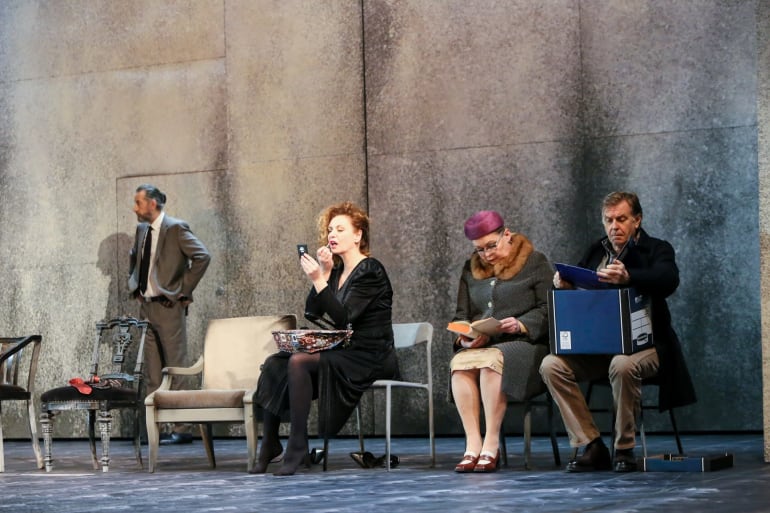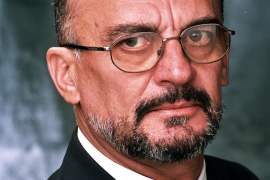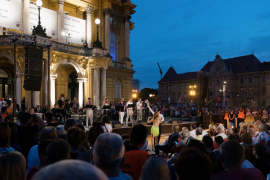World Theatre DayFrom the theatre — 27. March 2024.
World Theatre Day is marked globally on March 27 each year.
Drama The Vanishing by Tomislav Zajec, directed by Dora Ruždjak Podolski was performed at the CNT in Zagreb. The selection of the author of the Croatian message is organised by the Croatian Drama Artists' association and this year it was allocated to stage director Branko Ivanda. The author of this year's international message on the occasion of the World Theatre Day is the Norwegian writer, translator and dramatist and recipient of the Nobel Prize for literature Jon Fosse.
The messages were read to the audience by actors Zrinka Cvitešić and Igor Kovač.
CROATIAN MESSAGE FOR WORLD THEATRE DAY
Author: Branko Ivanda, stage director
Am I an intruder or a guest? How have I been honoured to explain the change of my unquestionable personal enthusiasm in just a few words? For half a century I have been weighing between film and theatre; I have even planned to turn theatres into cinemas, but at the end, I have discovered the enchanting secret that is contained in the unique process of creating a theatre performance. The theatre offers haven to the only art without a mediator. There is no canvas, no music instrument, no camera, no bricks or cement. Only the human body, voice and the personality of the actor. The rest of us are assistants, psychiatrists, writers and occasionally teachers, and often the pupils of its creativity. In this preparatory phase of a performance, an embryo of mutual creativity develops, a journey toward a tragic or comic enthusiasm and beauty. From beauty arises love and from love, a passion for theatre art that overwhelms us forever.
Almost half a century old and forgotten in the overseas political exile, the great European writer Sándor Márai before pointing a gun at his heart raised these questions: What is the true purpose of our lives? What do you think? This is a difficult question. Do you believe, just like I do, that the thing that gives our lives meaning is the passion that burns in ourselves forever? Perhaps if we experience such passion, we might not live in vain?
That winter, taken back by the earthquake and the fragility and ephemerality of human existence, isolated by Corona, every evening we were sitting on the ground floor of the abandoned, dangerously devasted building of Zagreb film, preparing a theatre performance. At first only the producer was present, then the stage director, and then two actors followed by three, and at the end there were four actors. For many the peak of a theatre performance is the opening night. Perhaps they are right.
But today I believe that the period relating to desk preparations is the key to a theatre act. In any case, this wandering through a labyrinth of text on the crossroad between the personal and the performative is the peak of the pre-opening night theatre pleasure.
Days and hours spent in the analysis of texts, conversations relating to the dramatic and the comical, in the adjustment of the nature of a drama character with the personality of the actor, the psychological, sometimes psychiatric profile of a private person, about the author's biography and the circle of the author's movements. Occasional discrepancies in the interpretation of dialogical fragments, yet they always lead to the final harmony; or apparently absurd details such as a movement of a hand that needs to peel an orange. Then about politics, food, illness, daily joys and beauty. And many more that connote a life of a family; even a temporary life of one theatrical family.
Throughout the past years, numerous respectable predecessors attempted to solve the secret of theatre art by a definition, because there is no artwork that does not possess a secret. They have mainly concentrated on the theatre space or the remoteness of a stage venue, belief in the theatre, acting (actor), courage and truth, mostly the question what is theatre? They were all right, but the definition remained a secret. Why? Perhaps because the foundation of theatre art is not static. It is a creative process that precedes the main work. It is a product of a complex relationship of a group of passionate people. Passion is more than love. Passion is a pledge of unconditional dedication. Even though sometimes it is concealed and hidden, passion is the drive of every theatrical creativity.
INTERNATIONAL WORLD THEATRE DAY MESSAGE
Author of the message: Jon Fosse, Norway
Norwegian writer and dramatist
Art Is Peace
Every person is unique and yet also like every other person. Our visible, external appearance is different from everyone else’s, of course, that is all well and good, but there is also something inside each and every one of us which belongs to that person alone—which is that person alone. We might call this their spirit, or their soul. Or else we can decide not to label it at all in words, just leave it alone.
But while we are all unlike one another, we’re alike too. People from every part of the world are fundamentally similar, no matter what language we speak, what skin colour we have, what hair colour we have.
This may be something of a paradox: that we are completely alike and utterly dissimilar at the same time. Maybe a person is intrinsically paradoxical, in our bridging of body and soul—we encompass both the most earthbound, tangible existence and something that transcends these material, earthbound limits.
Art, good art, manages in its wonderful way to combine the utterly unique with the universal. It lets us understand what is different—what is foreign, you might say—as being universal. By doing so, art breaks through the boundaries between languages, geographical regions, countries. It brings together not just everyone’s individual qualities but also, in another sense, the individual characteristics of every group of people, for example of every nation.
Art does this not by levelling differences and making everything the same, but, on the contrary, by showing us what is different from us, what is alien or foreign. All good art contains precisely that: something alien, something we cannot completely understand and yet at the same time do understand, in a way. It contains a mystery, so to speak. Something that fascinates us and thus pushes us beyond our limits and in so doing creates the transcendence that all art must both contain in itself and lead us to.
I know of no better way to bring opposites together. This is the exact reverse approach from that of the violent conflicts we see all too often in the world, which indulge the destructive temptation to annihilate anything foreign, anything unique and different, often by using the most inhuman inventions technology has put at our disposal. There is terrorism in the world. There is war. For people have an animalistic side, too, driven by the instinct to experience the other, the foreign, as a threat to one’s own existence rather than as a fascinating mystery.
This is how uniqueness—the differences we all can see—disappear, leaving behind a collective sameness where anything different is a threat that needs to be eradicated. What is seen from without as a difference, for example in religion or political ideology, becomes something that needs to be defeated and destroyed.
War is the battle against what lies deep inside all of us: something unique. And it is also a battle against art, against what lies deep inside all art.
I have been speaking here about art in general, not about theatre or playwriting in particular, but that is because, as I’ve said, all good art, deep down, revolves around the same thing: taking the utterly unique, the utterly specific, and making it universal. Uniting the particular with the universal by means of expressing it artistically: not eliminating its specificity but emphasizing this specificity, letting what is foreign and unfamiliar shine clearly through.
War and art are opposites, just as war and peace are opposites—it’s as simple as that. Art is peace.
Translated by: Damion Searls




